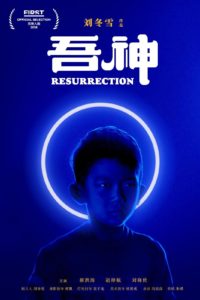Resurrection
吾神
China, 2018, colour, 16:9, 87 mins.
Director: Liu Dongxue 刘冬雪.
Rating: 6/10.
Engaging black comedy of rural superstition is given a fresh coat of paint by script and cast.
Erdaogou village, Yushu county, Jilin province, northeast China, Dec 2015. Yang Shuqing (Li Fengjie), the paralysed mother of illiterate cattle farmer Zhang Quan (Hao Honghai), dies after a long illness, during which Zhang Quan has cared for her on his own. At the funeral Zhang Quan’s younger brother (Xia Honggang) and sister (Zhang Qiuyue) turn up, despite never bothering to visit when their mother was still alive. During the traditional ceremony, the coffin starts to shake as it’s about to be nailed down. It then stops, and the burial goes ahead. Some time later, Zhang Quan’s young son, Zhang Xiaoman (Zhao Zihang), throws a fit and, when the doctor (Yu Yang) arrives, starts talking in his grandmother’s voice, accusing him of being a quack. The doctor runs off, and that night decks out his house with religious paraphernalia to ward off any bad spirits. Meanwhile, a villager’s wife, Fengqin (Tang Yujuan), who is also a devout Catholic, tells Zhang Quan and his wife (Liu Xiaoxia) that their son is possessed by Satan and should be taken to a church for exorcism. On the suggestion of another neighbour, Zhang Quan calls in a shaman (Wang Xingfeng) and his assistant Cuilan (Liu Ping), who confirms the boy is “possessed” and blames everything on the family neglecting to worship their ancestors. The shaman charges RMB2,000 for an exorcism, which has no effect. Fengqin then convinces Zhang Quan to turn to the Catholic church; after that fails to cure the boy, Zhang Quan consults an aged Buddhist monk.
REVIEW
A likeable black comedy about religious superstition in a northeast Chinese village, Resurrection 吾神 doesn’t exactly break new ground in its portrayal of gossipy rural life but is consistently engaging with its dry humour and, at a tight 87 minutes, doesn’t push the material beyond its natural length. Overall, it’s a noteworthy first feature by writer-director Liu Dongxue 刘冬雪, a graduate of Beijing-based Central Academy of Fine Arts whose previous credits include two shorts (Hear You 听见你, 2013; Town Road 小城大路, 2014) and whose empathy for the subject clearly stems from her own roots in the northeast.
Liu has the gift of showing the humorous side of a serious subject without trivialising it or simply making fun of her characters. After an elderly granny dies one winter, the traditional funeral is interrupted by her coffin suddenly shaking as if she’s come back from the dead. Soon afterwards, her grandson has a fit and starts talking as if he’s possessed: his panicky father, Zhang Quan, tries various remedies suggested by the villagers, moving from shamanism through Catholicism to Buddhism, all of which claim to be able to “exorcise” the “evil” – and charge some kind of price (either financial or spiritual) for the service.
Though all of the various religious remedies are shown to be useless, the film doesn’t grandstand or judge: each religious group preys on the inbred superstitions of the illiterate but well-meaning Zhang Quan but each is also shown to be utterly convinced by their own faiths. (The film’s Chinese title, “My God”, could refer to everyone’s separate beliefs.) When Zhang Quan is asked by a policeman why he didn’t just take his son to a hospital, he can only stare mutely at the ground – and it’s clear by the end that, though chastened by the process, his own beliefs haven’t changed much at all as life in the village goes on as usual.
Impressively, Liu presents all this in human, rather than doctrinaire, terms: it’s a black village comedy first and foremost, with a raft of lively, interesting characters and a portrait of life lived under the perpetual gaze and interference of the whole community, with its various tensions. Nothing new here, given Chinese cinema’s vast catalogue of rural movies, but given a fresh coat of paint by the script and performances.
Though the film’s crew is from Beijing, the cast is entirely non-professional and it’s a tribute to Liu that she’s managed to draw such filmworthy performances. As the confused but devoted father, Hao Honghai 郝洪海 is totally believable and very sympathetic, while peripheral characters like the nutty, sharp-tongued Christian of Tang Yujuan 唐玉娟 and the shaman’s fake assistant of Liu Ping 刘平 are especially memorable. Technical credits on an obviously budget production are sharp and clean, from the largely handheld but well-composed images of the frozen northeast by d.p. Guo Kai 郭凯 to the tight editing by Zhu Jing 朱靖 and sparse but eery music by Zhao Shijie 赵世杰.
The film has been spoken of in the same breath as another indie production, fake documentary The Possessed 中邪 (2016) by Ma Kai 马凯, but apart from having similar stories of exorcism they’re two very different movies.
CREDITS
No presenting company or production company credited.
Script: Liu Dongxue. Photography: Guo Kai. Editing: Zhu Jing. Music: Zhao Shijie. Art direction: Du Xiaocheng. Costumes: Liu Xuena, Wang Hongwei. Sound: Li Shangshang, Feng Liangliang.
Cast: Hao Honghai (Zhang Quan), Liu Xiaoxia (Xuefei, Zhang Quan’s wife), Zhao Zihang (Zhang Xiaoman, Zhang Quan’s son), Shang Hongliang (Wu), Tang Yujuan (Fengqin, Wu’s wife), Liu Ping (Cuilan), Zhou Jingwu (Yao Xianzi, shaman), Zhang Shuang (Xiaolingxian), Zhang Qiuyue (Zhang Ying, Zhang Quan’s younger sister), Xia Honggang (Zhang Neng, Zhang Quan’s younger brother), Wang Xingfeng (Hao, Catholic priest), Zhang Shuxu (old Buddhist monk), Li Yunfei (young Buddhist monk), Zhang Zhanjiang (Hao’s husband), Yu Yang (Zhou, doctor), Wang Hongwei (Zhou’s wife), Zhang Cai (Zhang Maolv), Wang Ruijie, Zhang Qin, Zhang Guoping (Catholic women), Lv Shulin (geomancer), Li Fengjie (Yang Shuqing, Zhang Quan’s mother).
Premiere: First Film Festival (Debut Spotlight), Xining, China, 22 Jul 2018.
Release: China, tba.
